Reflective Approach to Learning: Feedback for Assessment Success
VerifiedAdded on 2023/06/08
|10
|2348
|135
Essay
AI Summary
This essay delves into the significance of reflective learning in enhancing students' learning abilities, employing Gibb's reflective model to critically analyze learning experiences. It emphasizes the crucial role of feedback and feedforward in understanding current performance levels and guiding future actions. The essay further explores how a reflective approach to feedback and feedforward enables students to identify strengths and weaknesses, make necessary improvements, and ultimately enhance their performance in formative and summative assessments. By focusing on not repeating past mistakes and adopting effective learning strategies, students can positively influence their learning abilities and achieve better results. The reflective approach, therefore, serves as a vital tool for continuous improvement and academic success.
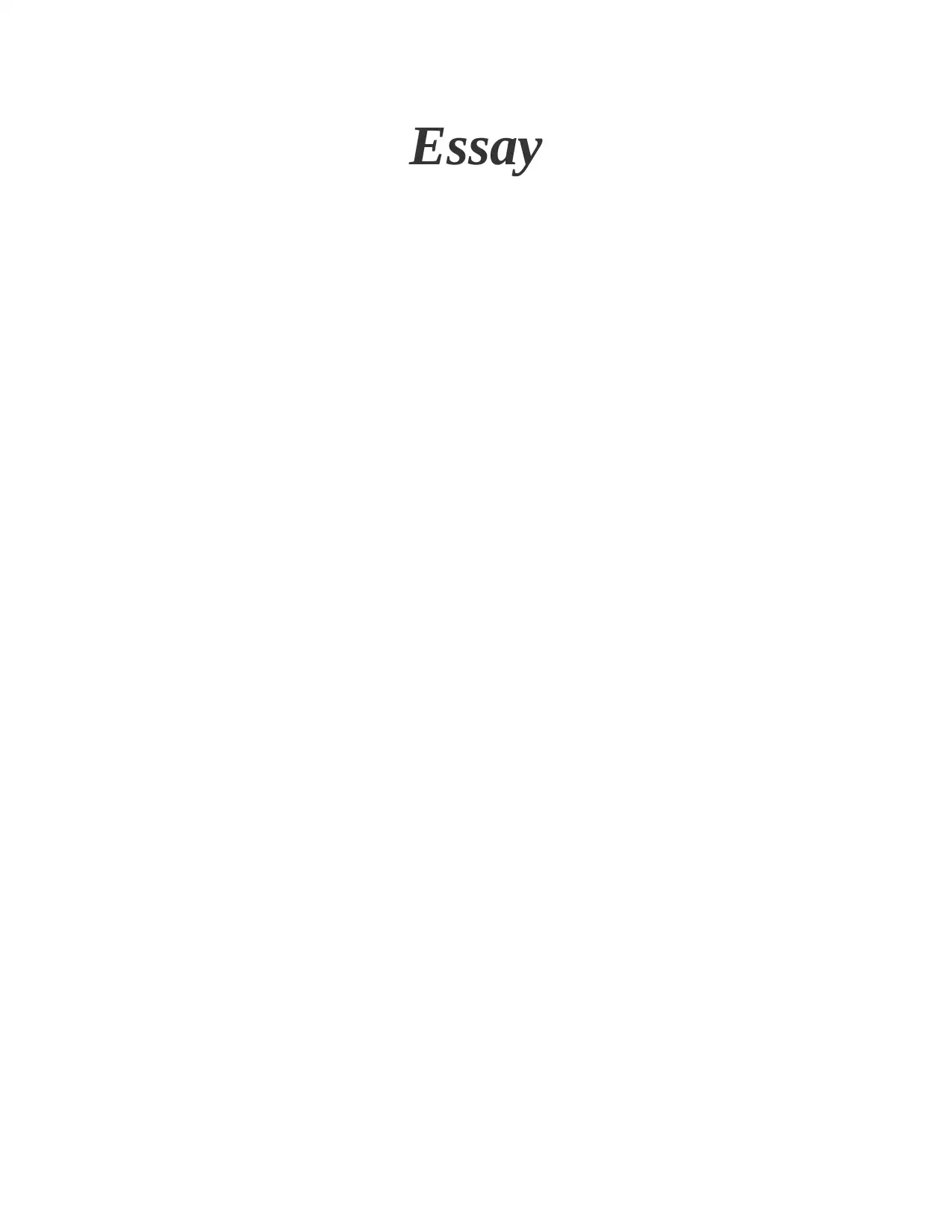
Essay
Paraphrase This Document
Need a fresh take? Get an instant paraphrase of this document with our AI Paraphraser
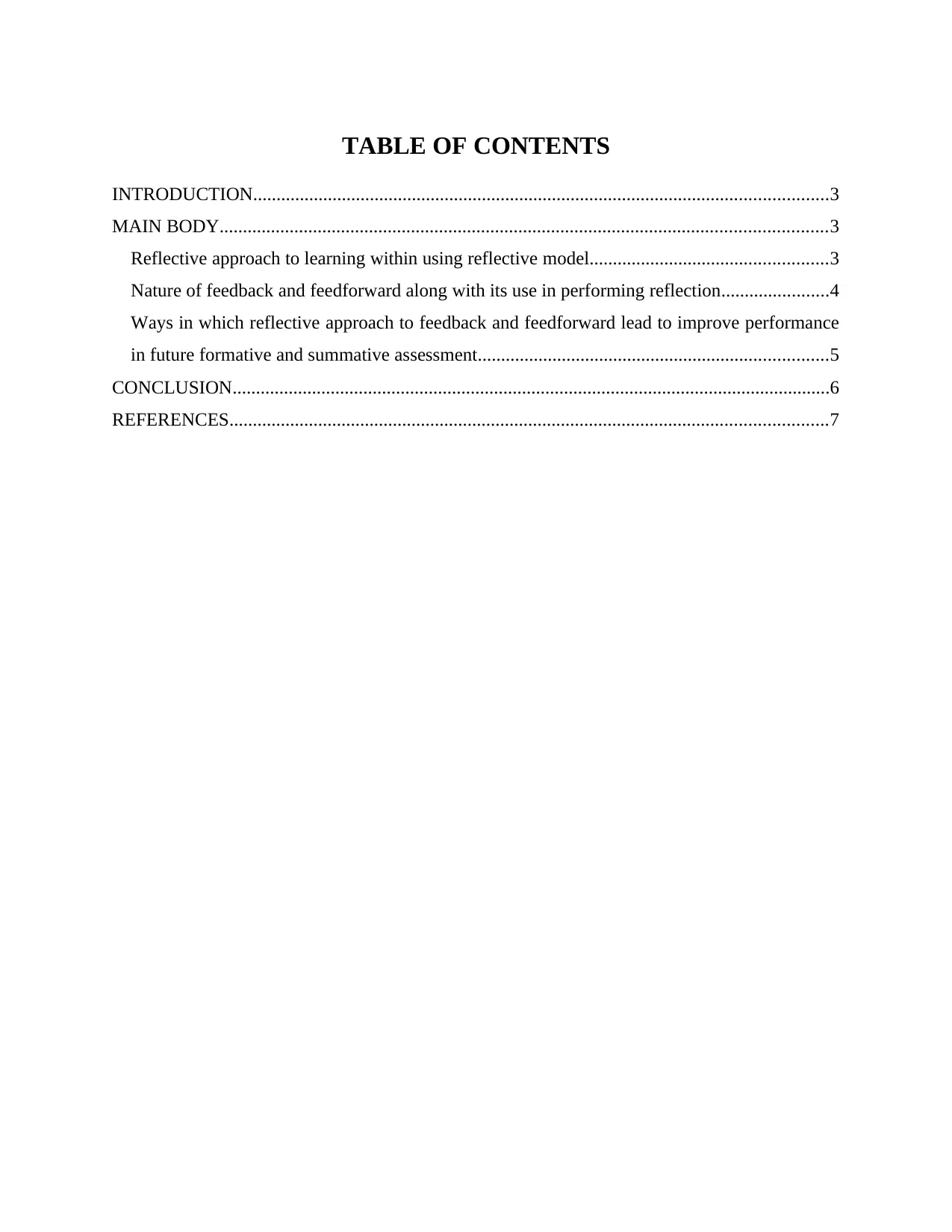
TABLE OF CONTENTS
INTRODUCTION...........................................................................................................................3
MAIN BODY..................................................................................................................................3
Reflective approach to learning within using reflective model...................................................3
Nature of feedback and feedforward along with its use in performing reflection.......................4
Ways in which reflective approach to feedback and feedforward lead to improve performance
in future formative and summative assessment...........................................................................5
CONCLUSION................................................................................................................................6
REFERENCES................................................................................................................................7
INTRODUCTION...........................................................................................................................3
MAIN BODY..................................................................................................................................3
Reflective approach to learning within using reflective model...................................................3
Nature of feedback and feedforward along with its use in performing reflection.......................4
Ways in which reflective approach to feedback and feedforward lead to improve performance
in future formative and summative assessment...........................................................................5
CONCLUSION................................................................................................................................6
REFERENCES................................................................................................................................7
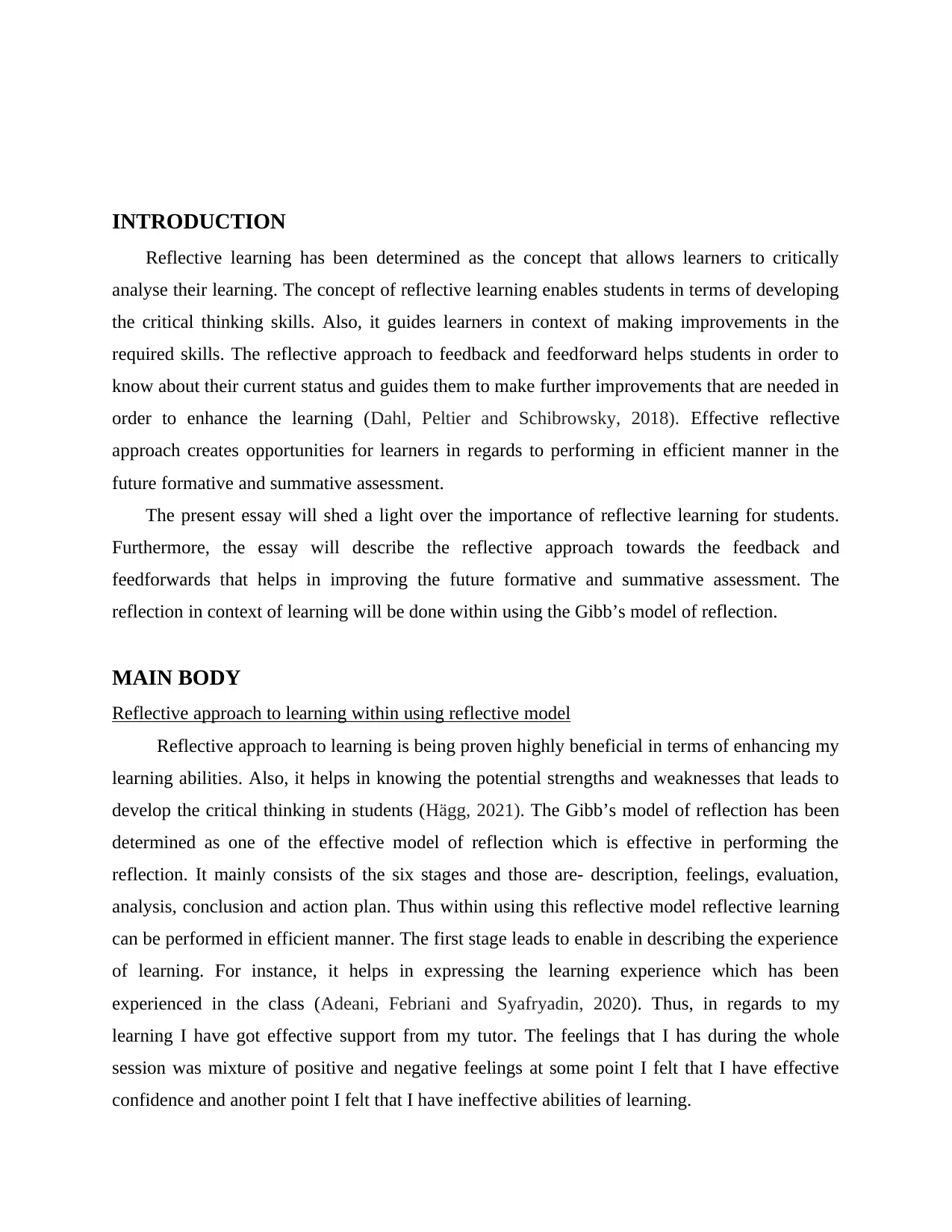
INTRODUCTION
Reflective learning has been determined as the concept that allows learners to critically
analyse their learning. The concept of reflective learning enables students in terms of developing
the critical thinking skills. Also, it guides learners in context of making improvements in the
required skills. The reflective approach to feedback and feedforward helps students in order to
know about their current status and guides them to make further improvements that are needed in
order to enhance the learning (Dahl, Peltier and Schibrowsky, 2018). Effective reflective
approach creates opportunities for learners in regards to performing in efficient manner in the
future formative and summative assessment.
The present essay will shed a light over the importance of reflective learning for students.
Furthermore, the essay will describe the reflective approach towards the feedback and
feedforwards that helps in improving the future formative and summative assessment. The
reflection in context of learning will be done within using the Gibb’s model of reflection.
MAIN BODY
Reflective approach to learning within using reflective model
Reflective approach to learning is being proven highly beneficial in terms of enhancing my
learning abilities. Also, it helps in knowing the potential strengths and weaknesses that leads to
develop the critical thinking in students (Hägg, 2021). The Gibb’s model of reflection has been
determined as one of the effective model of reflection which is effective in performing the
reflection. It mainly consists of the six stages and those are- description, feelings, evaluation,
analysis, conclusion and action plan. Thus within using this reflective model reflective learning
can be performed in efficient manner. The first stage leads to enable in describing the experience
of learning. For instance, it helps in expressing the learning experience which has been
experienced in the class (Adeani, Febriani and Syafryadin, 2020). Thus, in regards to my
learning I have got effective support from my tutor. The feelings that I has during the whole
session was mixture of positive and negative feelings at some point I felt that I have effective
confidence and another point I felt that I have ineffective abilities of learning.
Reflective learning has been determined as the concept that allows learners to critically
analyse their learning. The concept of reflective learning enables students in terms of developing
the critical thinking skills. Also, it guides learners in context of making improvements in the
required skills. The reflective approach to feedback and feedforward helps students in order to
know about their current status and guides them to make further improvements that are needed in
order to enhance the learning (Dahl, Peltier and Schibrowsky, 2018). Effective reflective
approach creates opportunities for learners in regards to performing in efficient manner in the
future formative and summative assessment.
The present essay will shed a light over the importance of reflective learning for students.
Furthermore, the essay will describe the reflective approach towards the feedback and
feedforwards that helps in improving the future formative and summative assessment. The
reflection in context of learning will be done within using the Gibb’s model of reflection.
MAIN BODY
Reflective approach to learning within using reflective model
Reflective approach to learning is being proven highly beneficial in terms of enhancing my
learning abilities. Also, it helps in knowing the potential strengths and weaknesses that leads to
develop the critical thinking in students (Hägg, 2021). The Gibb’s model of reflection has been
determined as one of the effective model of reflection which is effective in performing the
reflection. It mainly consists of the six stages and those are- description, feelings, evaluation,
analysis, conclusion and action plan. Thus within using this reflective model reflective learning
can be performed in efficient manner. The first stage leads to enable in describing the experience
of learning. For instance, it helps in expressing the learning experience which has been
experienced in the class (Adeani, Febriani and Syafryadin, 2020). Thus, in regards to my
learning I have got effective support from my tutor. The feelings that I has during the whole
session was mixture of positive and negative feelings at some point I felt that I have effective
confidence and another point I felt that I have ineffective abilities of learning.
⊘ This is a preview!⊘
Do you want full access?
Subscribe today to unlock all pages.

Trusted by 1+ million students worldwide
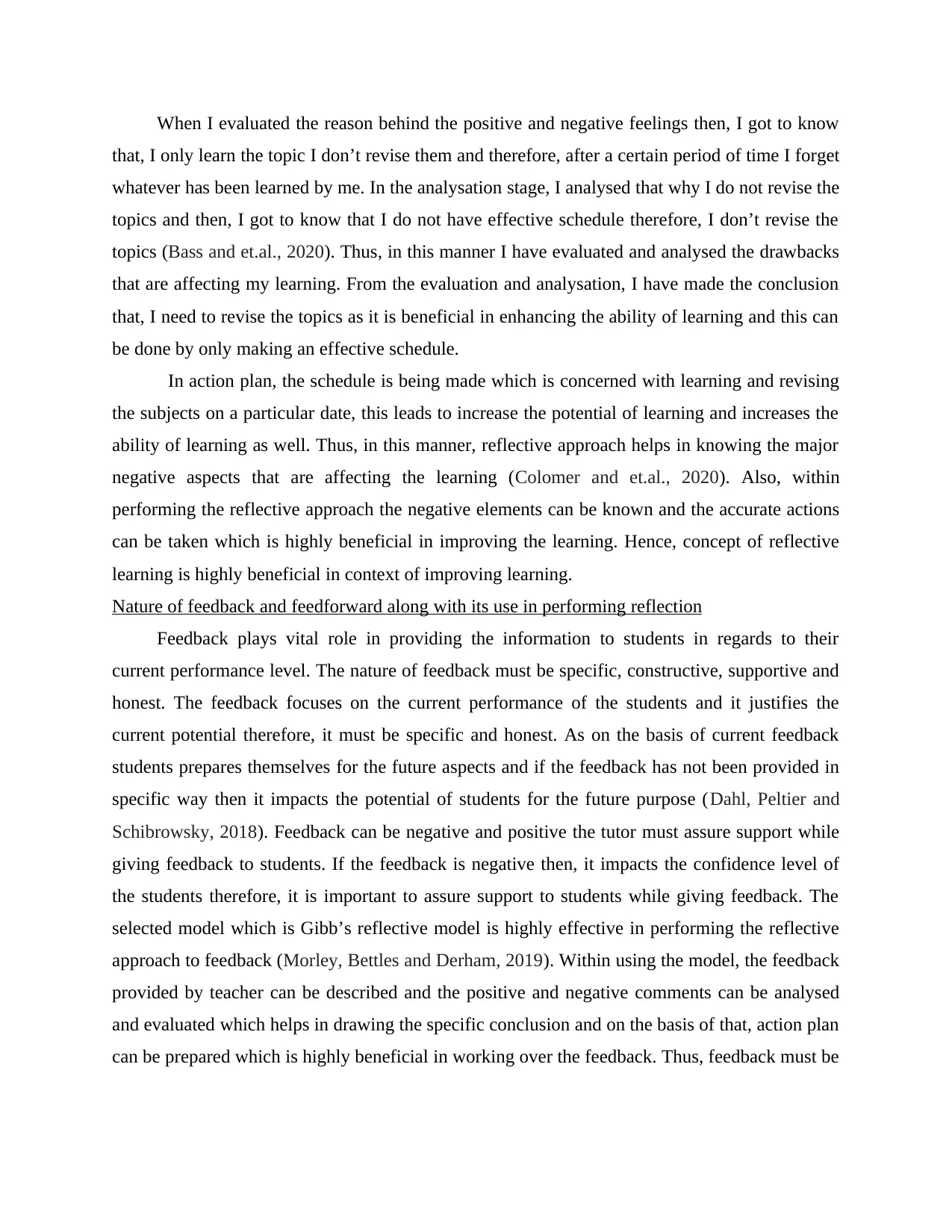
When I evaluated the reason behind the positive and negative feelings then, I got to know
that, I only learn the topic I don’t revise them and therefore, after a certain period of time I forget
whatever has been learned by me. In the analysation stage, I analysed that why I do not revise the
topics and then, I got to know that I do not have effective schedule therefore, I don’t revise the
topics (Bass and et.al., 2020). Thus, in this manner I have evaluated and analysed the drawbacks
that are affecting my learning. From the evaluation and analysation, I have made the conclusion
that, I need to revise the topics as it is beneficial in enhancing the ability of learning and this can
be done by only making an effective schedule.
In action plan, the schedule is being made which is concerned with learning and revising
the subjects on a particular date, this leads to increase the potential of learning and increases the
ability of learning as well. Thus, in this manner, reflective approach helps in knowing the major
negative aspects that are affecting the learning (Colomer and et.al., 2020). Also, within
performing the reflective approach the negative elements can be known and the accurate actions
can be taken which is highly beneficial in improving the learning. Hence, concept of reflective
learning is highly beneficial in context of improving learning.
Nature of feedback and feedforward along with its use in performing reflection
Feedback plays vital role in providing the information to students in regards to their
current performance level. The nature of feedback must be specific, constructive, supportive and
honest. The feedback focuses on the current performance of the students and it justifies the
current potential therefore, it must be specific and honest. As on the basis of current feedback
students prepares themselves for the future aspects and if the feedback has not been provided in
specific way then it impacts the potential of students for the future purpose (Dahl, Peltier and
Schibrowsky, 2018). Feedback can be negative and positive the tutor must assure support while
giving feedback to students. If the feedback is negative then, it impacts the confidence level of
the students therefore, it is important to assure support to students while giving feedback. The
selected model which is Gibb’s reflective model is highly effective in performing the reflective
approach to feedback (Morley, Bettles and Derham, 2019). Within using the model, the feedback
provided by teacher can be described and the positive and negative comments can be analysed
and evaluated which helps in drawing the specific conclusion and on the basis of that, action plan
can be prepared which is highly beneficial in working over the feedback. Thus, feedback must be
that, I only learn the topic I don’t revise them and therefore, after a certain period of time I forget
whatever has been learned by me. In the analysation stage, I analysed that why I do not revise the
topics and then, I got to know that I do not have effective schedule therefore, I don’t revise the
topics (Bass and et.al., 2020). Thus, in this manner I have evaluated and analysed the drawbacks
that are affecting my learning. From the evaluation and analysation, I have made the conclusion
that, I need to revise the topics as it is beneficial in enhancing the ability of learning and this can
be done by only making an effective schedule.
In action plan, the schedule is being made which is concerned with learning and revising
the subjects on a particular date, this leads to increase the potential of learning and increases the
ability of learning as well. Thus, in this manner, reflective approach helps in knowing the major
negative aspects that are affecting the learning (Colomer and et.al., 2020). Also, within
performing the reflective approach the negative elements can be known and the accurate actions
can be taken which is highly beneficial in improving the learning. Hence, concept of reflective
learning is highly beneficial in context of improving learning.
Nature of feedback and feedforward along with its use in performing reflection
Feedback plays vital role in providing the information to students in regards to their
current performance level. The nature of feedback must be specific, constructive, supportive and
honest. The feedback focuses on the current performance of the students and it justifies the
current potential therefore, it must be specific and honest. As on the basis of current feedback
students prepares themselves for the future aspects and if the feedback has not been provided in
specific way then it impacts the potential of students for the future purpose (Dahl, Peltier and
Schibrowsky, 2018). Feedback can be negative and positive the tutor must assure support while
giving feedback to students. If the feedback is negative then, it impacts the confidence level of
the students therefore, it is important to assure support to students while giving feedback. The
selected model which is Gibb’s reflective model is highly effective in performing the reflective
approach to feedback (Morley, Bettles and Derham, 2019). Within using the model, the feedback
provided by teacher can be described and the positive and negative comments can be analysed
and evaluated which helps in drawing the specific conclusion and on the basis of that, action plan
can be prepared which is highly beneficial in working over the feedback. Thus, feedback must be
Paraphrase This Document
Need a fresh take? Get an instant paraphrase of this document with our AI Paraphraser
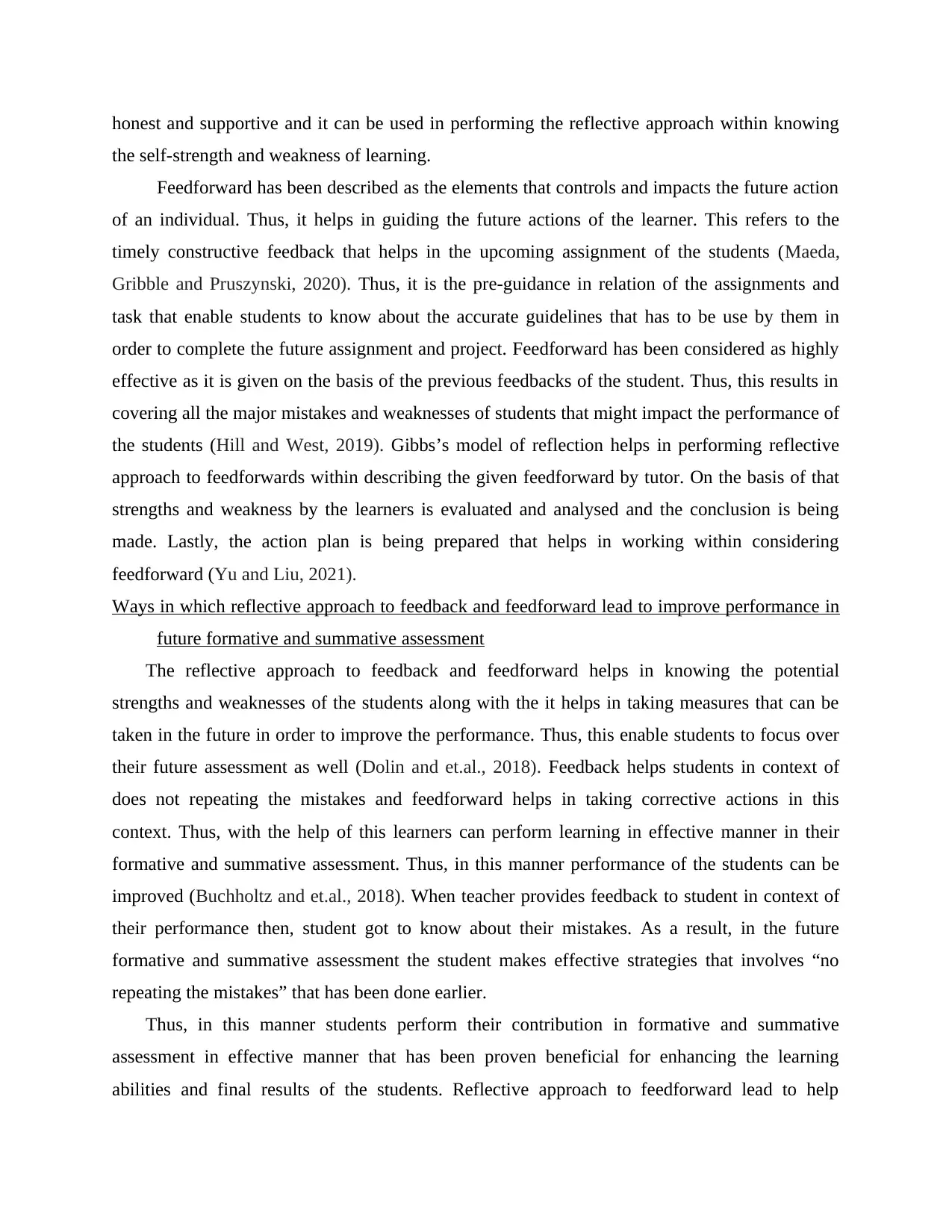
honest and supportive and it can be used in performing the reflective approach within knowing
the self-strength and weakness of learning.
Feedforward has been described as the elements that controls and impacts the future action
of an individual. Thus, it helps in guiding the future actions of the learner. This refers to the
timely constructive feedback that helps in the upcoming assignment of the students (Maeda,
Gribble and Pruszynski, 2020). Thus, it is the pre-guidance in relation of the assignments and
task that enable students to know about the accurate guidelines that has to be use by them in
order to complete the future assignment and project. Feedforward has been considered as highly
effective as it is given on the basis of the previous feedbacks of the student. Thus, this results in
covering all the major mistakes and weaknesses of students that might impact the performance of
the students (Hill and West, 2019). Gibbs’s model of reflection helps in performing reflective
approach to feedforwards within describing the given feedforward by tutor. On the basis of that
strengths and weakness by the learners is evaluated and analysed and the conclusion is being
made. Lastly, the action plan is being prepared that helps in working within considering
feedforward (Yu and Liu, 2021).
Ways in which reflective approach to feedback and feedforward lead to improve performance in
future formative and summative assessment
The reflective approach to feedback and feedforward helps in knowing the potential
strengths and weaknesses of the students along with the it helps in taking measures that can be
taken in the future in order to improve the performance. Thus, this enable students to focus over
their future assessment as well (Dolin and et.al., 2018). Feedback helps students in context of
does not repeating the mistakes and feedforward helps in taking corrective actions in this
context. Thus, with the help of this learners can perform learning in effective manner in their
formative and summative assessment. Thus, in this manner performance of the students can be
improved (Buchholtz and et.al., 2018). When teacher provides feedback to student in context of
their performance then, student got to know about their mistakes. As a result, in the future
formative and summative assessment the student makes effective strategies that involves “no
repeating the mistakes” that has been done earlier.
Thus, in this manner students perform their contribution in formative and summative
assessment in effective manner that has been proven beneficial for enhancing the learning
abilities and final results of the students. Reflective approach to feedforward lead to help
the self-strength and weakness of learning.
Feedforward has been described as the elements that controls and impacts the future action
of an individual. Thus, it helps in guiding the future actions of the learner. This refers to the
timely constructive feedback that helps in the upcoming assignment of the students (Maeda,
Gribble and Pruszynski, 2020). Thus, it is the pre-guidance in relation of the assignments and
task that enable students to know about the accurate guidelines that has to be use by them in
order to complete the future assignment and project. Feedforward has been considered as highly
effective as it is given on the basis of the previous feedbacks of the student. Thus, this results in
covering all the major mistakes and weaknesses of students that might impact the performance of
the students (Hill and West, 2019). Gibbs’s model of reflection helps in performing reflective
approach to feedforwards within describing the given feedforward by tutor. On the basis of that
strengths and weakness by the learners is evaluated and analysed and the conclusion is being
made. Lastly, the action plan is being prepared that helps in working within considering
feedforward (Yu and Liu, 2021).
Ways in which reflective approach to feedback and feedforward lead to improve performance in
future formative and summative assessment
The reflective approach to feedback and feedforward helps in knowing the potential
strengths and weaknesses of the students along with the it helps in taking measures that can be
taken in the future in order to improve the performance. Thus, this enable students to focus over
their future assessment as well (Dolin and et.al., 2018). Feedback helps students in context of
does not repeating the mistakes and feedforward helps in taking corrective actions in this
context. Thus, with the help of this learners can perform learning in effective manner in their
formative and summative assessment. Thus, in this manner performance of the students can be
improved (Buchholtz and et.al., 2018). When teacher provides feedback to student in context of
their performance then, student got to know about their mistakes. As a result, in the future
formative and summative assessment the student makes effective strategies that involves “no
repeating the mistakes” that has been done earlier.
Thus, in this manner students perform their contribution in formative and summative
assessment in effective manner that has been proven beneficial for enhancing the learning
abilities and final results of the students. Reflective approach to feedforward lead to help
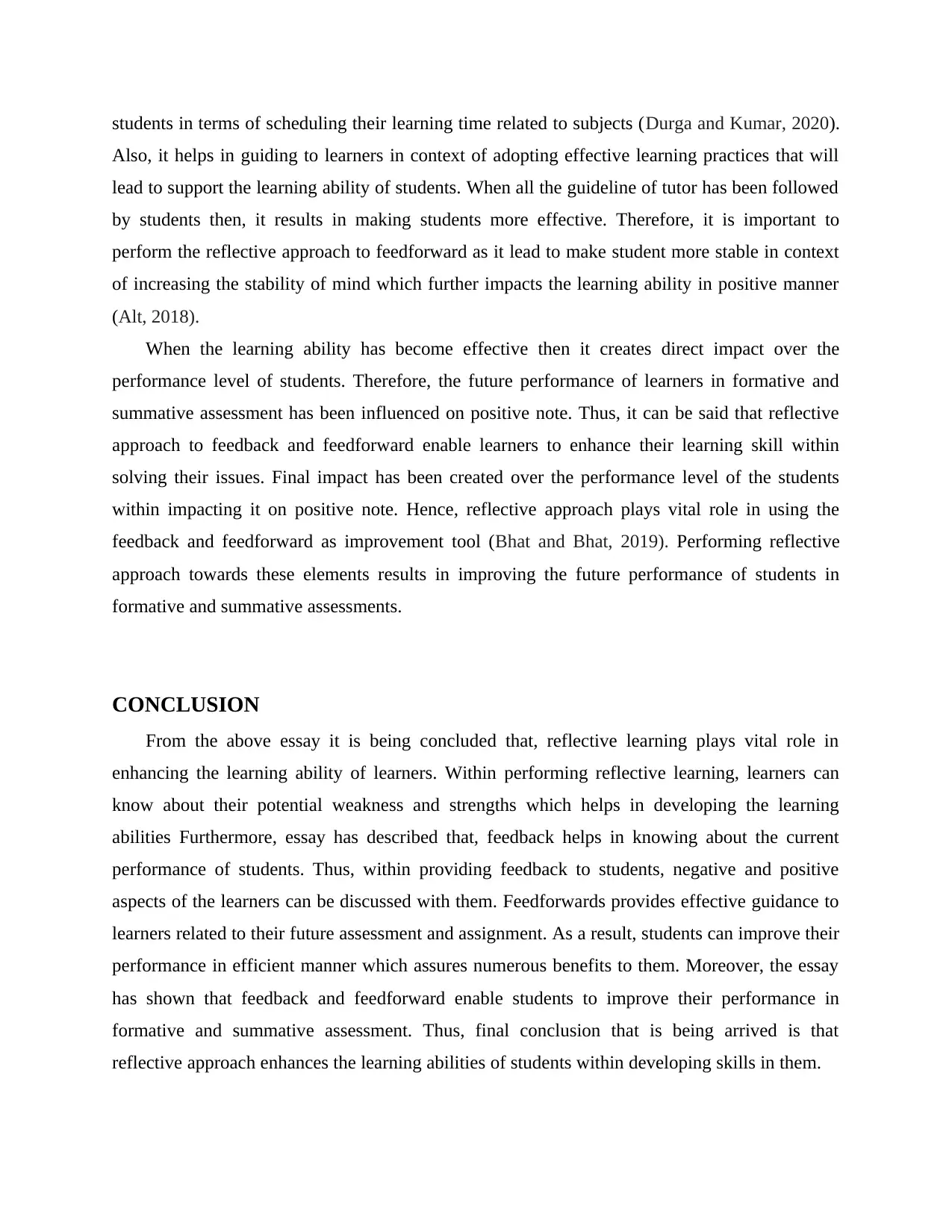
students in terms of scheduling their learning time related to subjects (Durga and Kumar, 2020).
Also, it helps in guiding to learners in context of adopting effective learning practices that will
lead to support the learning ability of students. When all the guideline of tutor has been followed
by students then, it results in making students more effective. Therefore, it is important to
perform the reflective approach to feedforward as it lead to make student more stable in context
of increasing the stability of mind which further impacts the learning ability in positive manner
(Alt, 2018).
When the learning ability has become effective then it creates direct impact over the
performance level of students. Therefore, the future performance of learners in formative and
summative assessment has been influenced on positive note. Thus, it can be said that reflective
approach to feedback and feedforward enable learners to enhance their learning skill within
solving their issues. Final impact has been created over the performance level of the students
within impacting it on positive note. Hence, reflective approach plays vital role in using the
feedback and feedforward as improvement tool (Bhat and Bhat, 2019). Performing reflective
approach towards these elements results in improving the future performance of students in
formative and summative assessments.
CONCLUSION
From the above essay it is being concluded that, reflective learning plays vital role in
enhancing the learning ability of learners. Within performing reflective learning, learners can
know about their potential weakness and strengths which helps in developing the learning
abilities Furthermore, essay has described that, feedback helps in knowing about the current
performance of students. Thus, within providing feedback to students, negative and positive
aspects of the learners can be discussed with them. Feedforwards provides effective guidance to
learners related to their future assessment and assignment. As a result, students can improve their
performance in efficient manner which assures numerous benefits to them. Moreover, the essay
has shown that feedback and feedforward enable students to improve their performance in
formative and summative assessment. Thus, final conclusion that is being arrived is that
reflective approach enhances the learning abilities of students within developing skills in them.
Also, it helps in guiding to learners in context of adopting effective learning practices that will
lead to support the learning ability of students. When all the guideline of tutor has been followed
by students then, it results in making students more effective. Therefore, it is important to
perform the reflective approach to feedforward as it lead to make student more stable in context
of increasing the stability of mind which further impacts the learning ability in positive manner
(Alt, 2018).
When the learning ability has become effective then it creates direct impact over the
performance level of students. Therefore, the future performance of learners in formative and
summative assessment has been influenced on positive note. Thus, it can be said that reflective
approach to feedback and feedforward enable learners to enhance their learning skill within
solving their issues. Final impact has been created over the performance level of the students
within impacting it on positive note. Hence, reflective approach plays vital role in using the
feedback and feedforward as improvement tool (Bhat and Bhat, 2019). Performing reflective
approach towards these elements results in improving the future performance of students in
formative and summative assessments.
CONCLUSION
From the above essay it is being concluded that, reflective learning plays vital role in
enhancing the learning ability of learners. Within performing reflective learning, learners can
know about their potential weakness and strengths which helps in developing the learning
abilities Furthermore, essay has described that, feedback helps in knowing about the current
performance of students. Thus, within providing feedback to students, negative and positive
aspects of the learners can be discussed with them. Feedforwards provides effective guidance to
learners related to their future assessment and assignment. As a result, students can improve their
performance in efficient manner which assures numerous benefits to them. Moreover, the essay
has shown that feedback and feedforward enable students to improve their performance in
formative and summative assessment. Thus, final conclusion that is being arrived is that
reflective approach enhances the learning abilities of students within developing skills in them.
⊘ This is a preview!⊘
Do you want full access?
Subscribe today to unlock all pages.

Trusted by 1+ million students worldwide
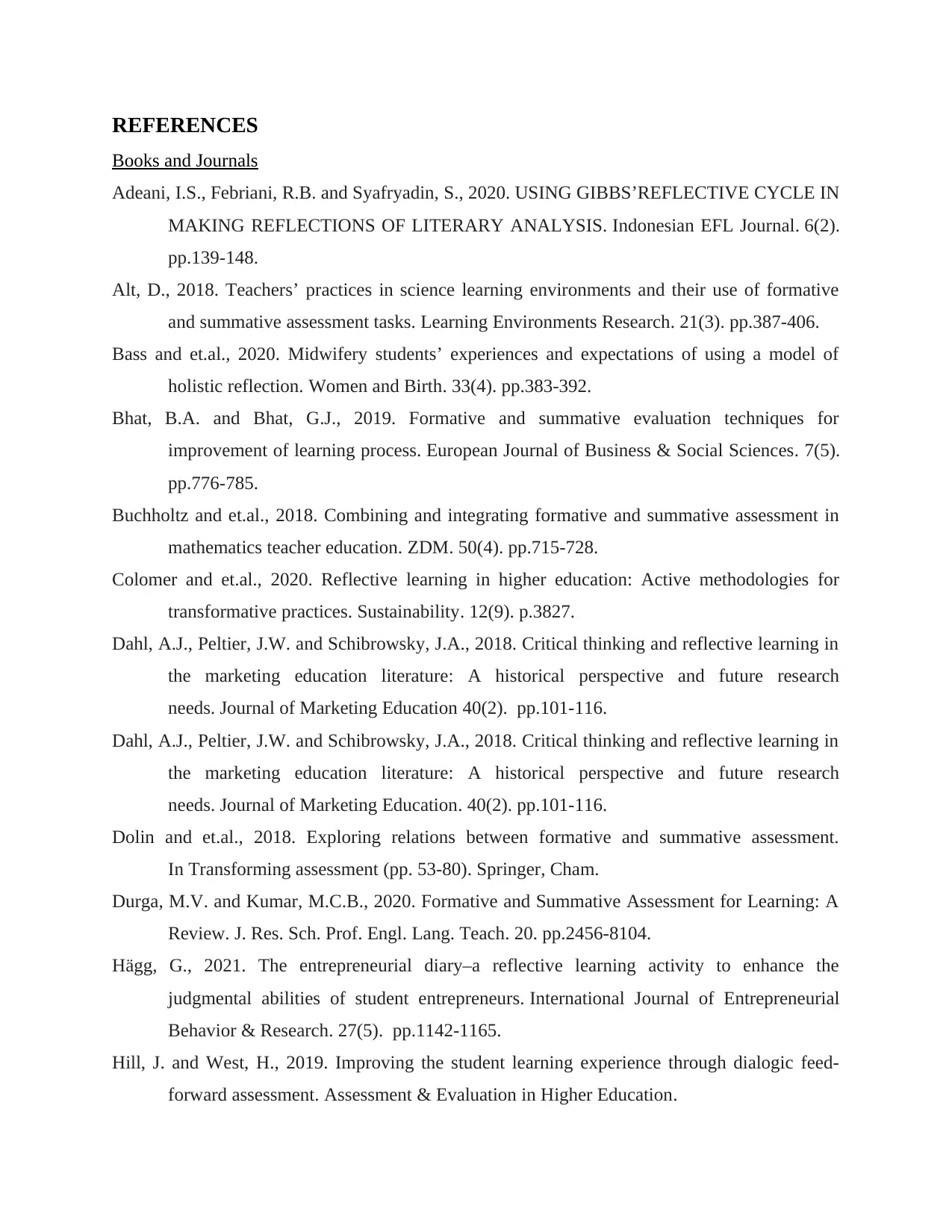
REFERENCES
Books and Journals
Adeani, I.S., Febriani, R.B. and Syafryadin, S., 2020. USING GIBBS’REFLECTIVE CYCLE IN
MAKING REFLECTIONS OF LITERARY ANALYSIS. Indonesian EFL Journal. 6(2).
pp.139-148.
Alt, D., 2018. Teachers’ practices in science learning environments and their use of formative
and summative assessment tasks. Learning Environments Research. 21(3). pp.387-406.
Bass and et.al., 2020. Midwifery students’ experiences and expectations of using a model of
holistic reflection. Women and Birth. 33(4). pp.383-392.
Bhat, B.A. and Bhat, G.J., 2019. Formative and summative evaluation techniques for
improvement of learning process. European Journal of Business & Social Sciences. 7(5).
pp.776-785.
Buchholtz and et.al., 2018. Combining and integrating formative and summative assessment in
mathematics teacher education. ZDM. 50(4). pp.715-728.
Colomer and et.al., 2020. Reflective learning in higher education: Active methodologies for
transformative practices. Sustainability. 12(9). p.3827.
Dahl, A.J., Peltier, J.W. and Schibrowsky, J.A., 2018. Critical thinking and reflective learning in
the marketing education literature: A historical perspective and future research
needs. Journal of Marketing Education 40(2). pp.101-116.
Dahl, A.J., Peltier, J.W. and Schibrowsky, J.A., 2018. Critical thinking and reflective learning in
the marketing education literature: A historical perspective and future research
needs. Journal of Marketing Education. 40(2). pp.101-116.
Dolin and et.al., 2018. Exploring relations between formative and summative assessment.
In Transforming assessment (pp. 53-80). Springer, Cham.
Durga, M.V. and Kumar, M.C.B., 2020. Formative and Summative Assessment for Learning: A
Review. J. Res. Sch. Prof. Engl. Lang. Teach. 20. pp.2456-8104.
Hägg, G., 2021. The entrepreneurial diary–a reflective learning activity to enhance the
judgmental abilities of student entrepreneurs. International Journal of Entrepreneurial
Behavior & Research. 27(5). pp.1142-1165.
Hill, J. and West, H., 2019. Improving the student learning experience through dialogic feed-
forward assessment. Assessment & Evaluation in Higher Education.
Books and Journals
Adeani, I.S., Febriani, R.B. and Syafryadin, S., 2020. USING GIBBS’REFLECTIVE CYCLE IN
MAKING REFLECTIONS OF LITERARY ANALYSIS. Indonesian EFL Journal. 6(2).
pp.139-148.
Alt, D., 2018. Teachers’ practices in science learning environments and their use of formative
and summative assessment tasks. Learning Environments Research. 21(3). pp.387-406.
Bass and et.al., 2020. Midwifery students’ experiences and expectations of using a model of
holistic reflection. Women and Birth. 33(4). pp.383-392.
Bhat, B.A. and Bhat, G.J., 2019. Formative and summative evaluation techniques for
improvement of learning process. European Journal of Business & Social Sciences. 7(5).
pp.776-785.
Buchholtz and et.al., 2018. Combining and integrating formative and summative assessment in
mathematics teacher education. ZDM. 50(4). pp.715-728.
Colomer and et.al., 2020. Reflective learning in higher education: Active methodologies for
transformative practices. Sustainability. 12(9). p.3827.
Dahl, A.J., Peltier, J.W. and Schibrowsky, J.A., 2018. Critical thinking and reflective learning in
the marketing education literature: A historical perspective and future research
needs. Journal of Marketing Education 40(2). pp.101-116.
Dahl, A.J., Peltier, J.W. and Schibrowsky, J.A., 2018. Critical thinking and reflective learning in
the marketing education literature: A historical perspective and future research
needs. Journal of Marketing Education. 40(2). pp.101-116.
Dolin and et.al., 2018. Exploring relations between formative and summative assessment.
In Transforming assessment (pp. 53-80). Springer, Cham.
Durga, M.V. and Kumar, M.C.B., 2020. Formative and Summative Assessment for Learning: A
Review. J. Res. Sch. Prof. Engl. Lang. Teach. 20. pp.2456-8104.
Hägg, G., 2021. The entrepreneurial diary–a reflective learning activity to enhance the
judgmental abilities of student entrepreneurs. International Journal of Entrepreneurial
Behavior & Research. 27(5). pp.1142-1165.
Hill, J. and West, H., 2019. Improving the student learning experience through dialogic feed-
forward assessment. Assessment & Evaluation in Higher Education.
Paraphrase This Document
Need a fresh take? Get an instant paraphrase of this document with our AI Paraphraser
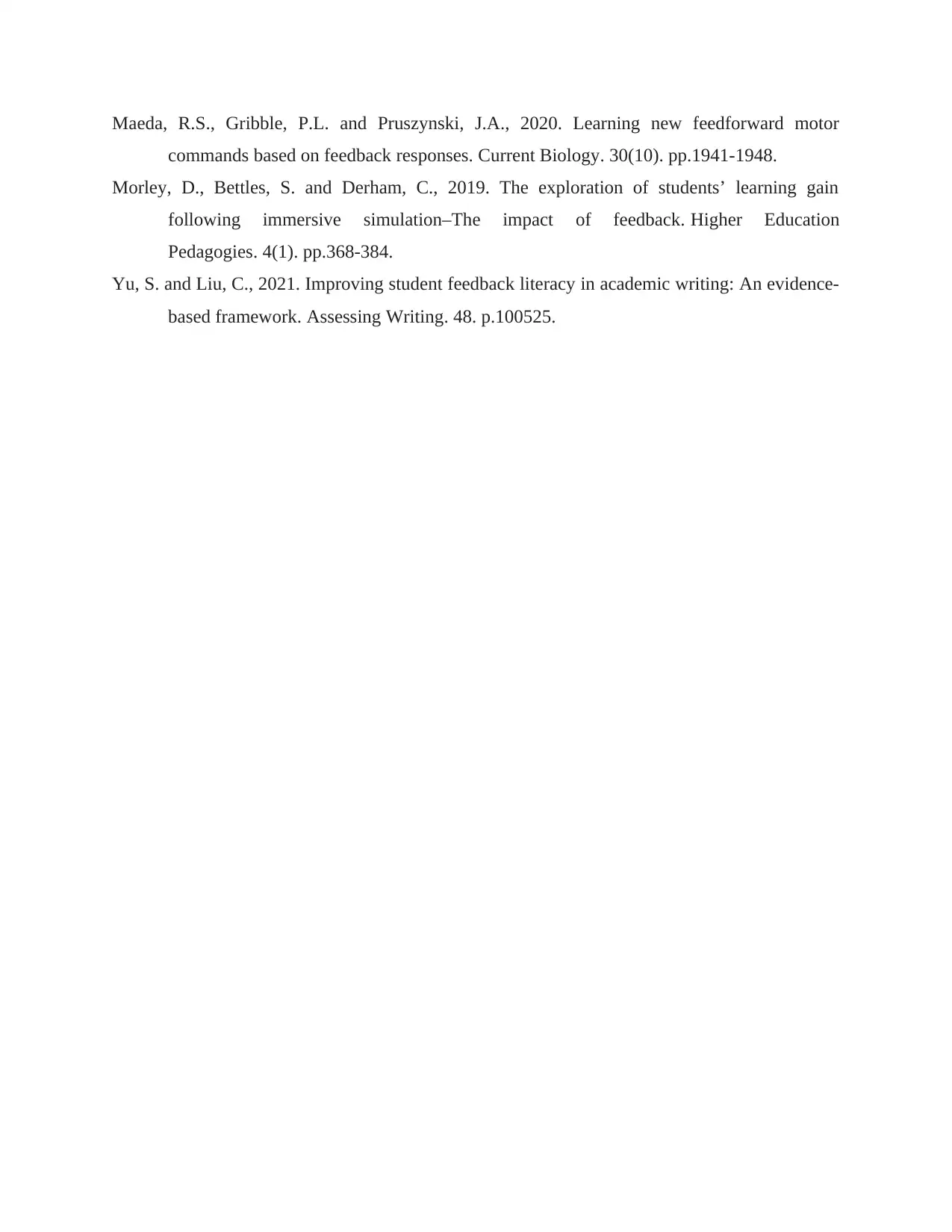
Maeda, R.S., Gribble, P.L. and Pruszynski, J.A., 2020. Learning new feedforward motor
commands based on feedback responses. Current Biology. 30(10). pp.1941-1948.
Morley, D., Bettles, S. and Derham, C., 2019. The exploration of students’ learning gain
following immersive simulation–The impact of feedback. Higher Education
Pedagogies. 4(1). pp.368-384.
Yu, S. and Liu, C., 2021. Improving student feedback literacy in academic writing: An evidence-
based framework. Assessing Writing. 48. p.100525.
commands based on feedback responses. Current Biology. 30(10). pp.1941-1948.
Morley, D., Bettles, S. and Derham, C., 2019. The exploration of students’ learning gain
following immersive simulation–The impact of feedback. Higher Education
Pedagogies. 4(1). pp.368-384.
Yu, S. and Liu, C., 2021. Improving student feedback literacy in academic writing: An evidence-
based framework. Assessing Writing. 48. p.100525.

⊘ This is a preview!⊘
Do you want full access?
Subscribe today to unlock all pages.

Trusted by 1+ million students worldwide

1 out of 10
Related Documents
Your All-in-One AI-Powered Toolkit for Academic Success.
+13062052269
info@desklib.com
Available 24*7 on WhatsApp / Email
![[object Object]](/_next/static/media/star-bottom.7253800d.svg)
Unlock your academic potential
Copyright © 2020–2026 A2Z Services. All Rights Reserved. Developed and managed by ZUCOL.



